Textual Analysis of George W. Bush's Speech to Congress: A Report
VerifiedAdded on 2020/02/05
|6
|1628
|202
Report
AI Summary
This report provides a detailed textual analysis of a speech delivered by President George W. Bush to the U.S. Congress on September 20, 2001. The analysis employs a speech-act methodology, drawing upon the work of Quentin Skinner and conceptual history to understand the speech's context and implications. The report explores the possibilities and limitations of this approach, identifying various speech acts such as compliments, announcements, and acknowledgements within the text. It discusses the objects of study, which include the historical conceptions and war assumptions presented in the speech, and the relevant actors involved. The analysis also addresses difficulties encountered during the study, such as biases and the challenge of understanding audience perception. Furthermore, the report highlights the learnings from the analysis, emphasizing the importance of interdisciplinary methodologies in interpreting historical texts. The study also considers the role of etymology and the evolution of terms within the speech's framework, offering insights into the President's communication strategies and the broader context of the post-9/11 era.
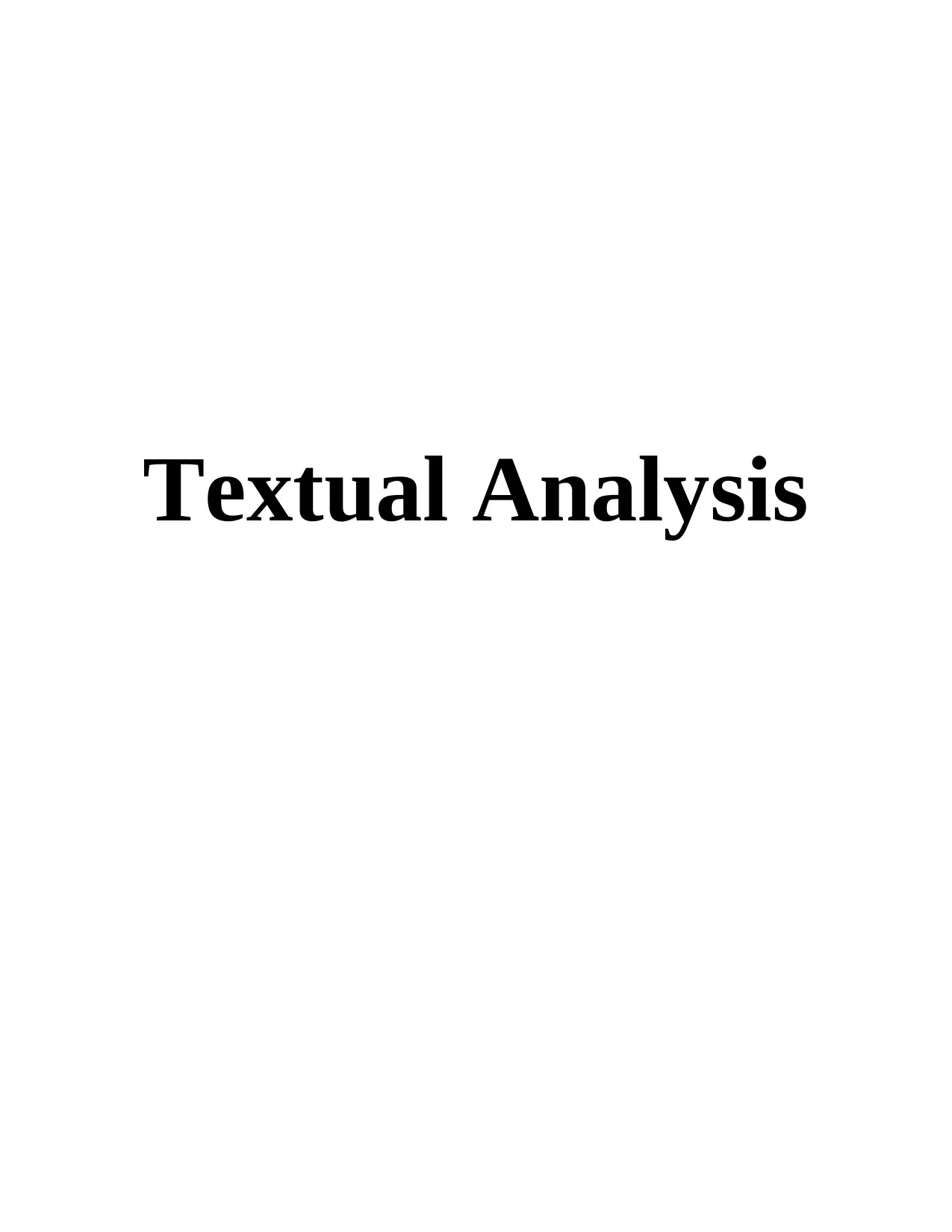
Textual Analysis
Paraphrase This Document
Need a fresh take? Get an instant paraphrase of this document with our AI Paraphraser
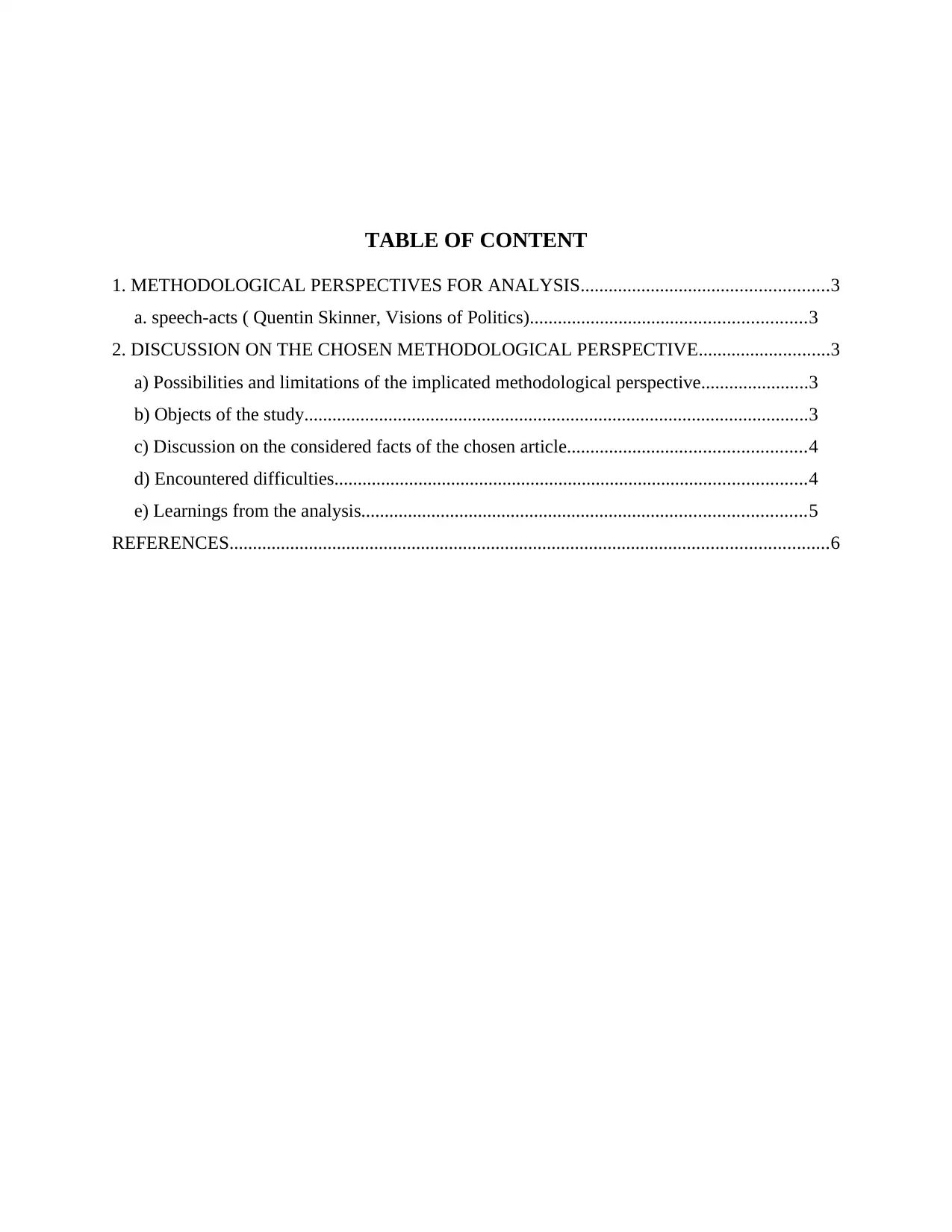
TABLE OF CONTENT
1. METHODOLOGICAL PERSPECTIVES FOR ANALYSIS.....................................................3
a. speech-acts ( Quentin Skinner, Visions of Politics)...........................................................3
2. DISCUSSION ON THE CHOSEN METHODOLOGICAL PERSPECTIVE............................3
a) Possibilities and limitations of the implicated methodological perspective.......................3
b) Objects of the study............................................................................................................3
c) Discussion on the considered facts of the chosen article...................................................4
d) Encountered difficulties.....................................................................................................4
e) Learnings from the analysis...............................................................................................5
REFERENCES................................................................................................................................6
1. METHODOLOGICAL PERSPECTIVES FOR ANALYSIS.....................................................3
a. speech-acts ( Quentin Skinner, Visions of Politics)...........................................................3
2. DISCUSSION ON THE CHOSEN METHODOLOGICAL PERSPECTIVE............................3
a) Possibilities and limitations of the implicated methodological perspective.......................3
b) Objects of the study............................................................................................................3
c) Discussion on the considered facts of the chosen article...................................................4
d) Encountered difficulties.....................................................................................................4
e) Learnings from the analysis...............................................................................................5
REFERENCES................................................................................................................................6
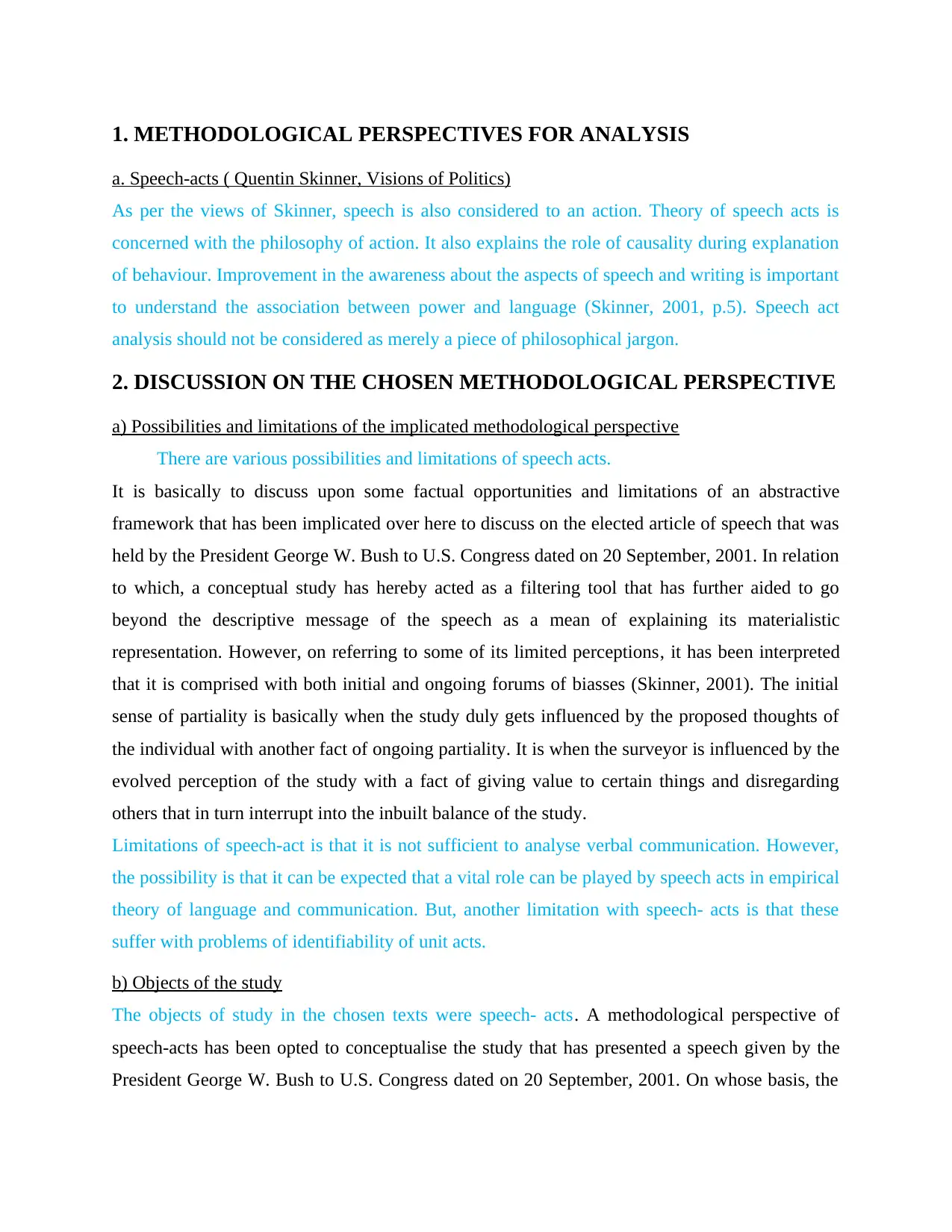
1. METHODOLOGICAL PERSPECTIVES FOR ANALYSIS
a. Speech-acts ( Quentin Skinner, Visions of Politics)
As per the views of Skinner, speech is also considered to an action. Theory of speech acts is
concerned with the philosophy of action. It also explains the role of causality during explanation
of behaviour. Improvement in the awareness about the aspects of speech and writing is important
to understand the association between power and language (Skinner, 2001, p.5). Speech act
analysis should not be considered as merely a piece of philosophical jargon.
2. DISCUSSION ON THE CHOSEN METHODOLOGICAL PERSPECTIVE
a) Possibilities and limitations of the implicated methodological perspective
There are various possibilities and limitations of speech acts.
It is basically to discuss upon some factual opportunities and limitations of an abstractive
framework that has been implicated over here to discuss on the elected article of speech that was
held by the President George W. Bush to U.S. Congress dated on 20 September, 2001. In relation
to which, a conceptual study has hereby acted as a filtering tool that has further aided to go
beyond the descriptive message of the speech as a mean of explaining its materialistic
representation. However, on referring to some of its limited perceptions, it has been interpreted
that it is comprised with both initial and ongoing forums of biasses (Skinner, 2001). The initial
sense of partiality is basically when the study duly gets influenced by the proposed thoughts of
the individual with another fact of ongoing partiality. It is when the surveyor is influenced by the
evolved perception of the study with a fact of giving value to certain things and disregarding
others that in turn interrupt into the inbuilt balance of the study.
Limitations of speech-act is that it is not sufficient to analyse verbal communication. However,
the possibility is that it can be expected that a vital role can be played by speech acts in empirical
theory of language and communication. But, another limitation with speech- acts is that these
suffer with problems of identifiability of unit acts.
b) Objects of the study
The objects of study in the chosen texts were speech- acts. A methodological perspective of
speech-acts has been opted to conceptualise the study that has presented a speech given by the
President George W. Bush to U.S. Congress dated on 20 September, 2001. On whose basis, the
a. Speech-acts ( Quentin Skinner, Visions of Politics)
As per the views of Skinner, speech is also considered to an action. Theory of speech acts is
concerned with the philosophy of action. It also explains the role of causality during explanation
of behaviour. Improvement in the awareness about the aspects of speech and writing is important
to understand the association between power and language (Skinner, 2001, p.5). Speech act
analysis should not be considered as merely a piece of philosophical jargon.
2. DISCUSSION ON THE CHOSEN METHODOLOGICAL PERSPECTIVE
a) Possibilities and limitations of the implicated methodological perspective
There are various possibilities and limitations of speech acts.
It is basically to discuss upon some factual opportunities and limitations of an abstractive
framework that has been implicated over here to discuss on the elected article of speech that was
held by the President George W. Bush to U.S. Congress dated on 20 September, 2001. In relation
to which, a conceptual study has hereby acted as a filtering tool that has further aided to go
beyond the descriptive message of the speech as a mean of explaining its materialistic
representation. However, on referring to some of its limited perceptions, it has been interpreted
that it is comprised with both initial and ongoing forums of biasses (Skinner, 2001). The initial
sense of partiality is basically when the study duly gets influenced by the proposed thoughts of
the individual with another fact of ongoing partiality. It is when the surveyor is influenced by the
evolved perception of the study with a fact of giving value to certain things and disregarding
others that in turn interrupt into the inbuilt balance of the study.
Limitations of speech-act is that it is not sufficient to analyse verbal communication. However,
the possibility is that it can be expected that a vital role can be played by speech acts in empirical
theory of language and communication. But, another limitation with speech- acts is that these
suffer with problems of identifiability of unit acts.
b) Objects of the study
The objects of study in the chosen texts were speech- acts. A methodological perspective of
speech-acts has been opted to conceptualise the study that has presented a speech given by the
President George W. Bush to U.S. Congress dated on 20 September, 2001. On whose basis, the
⊘ This is a preview!⊘
Do you want full access?
Subscribe today to unlock all pages.

Trusted by 1+ million students worldwide
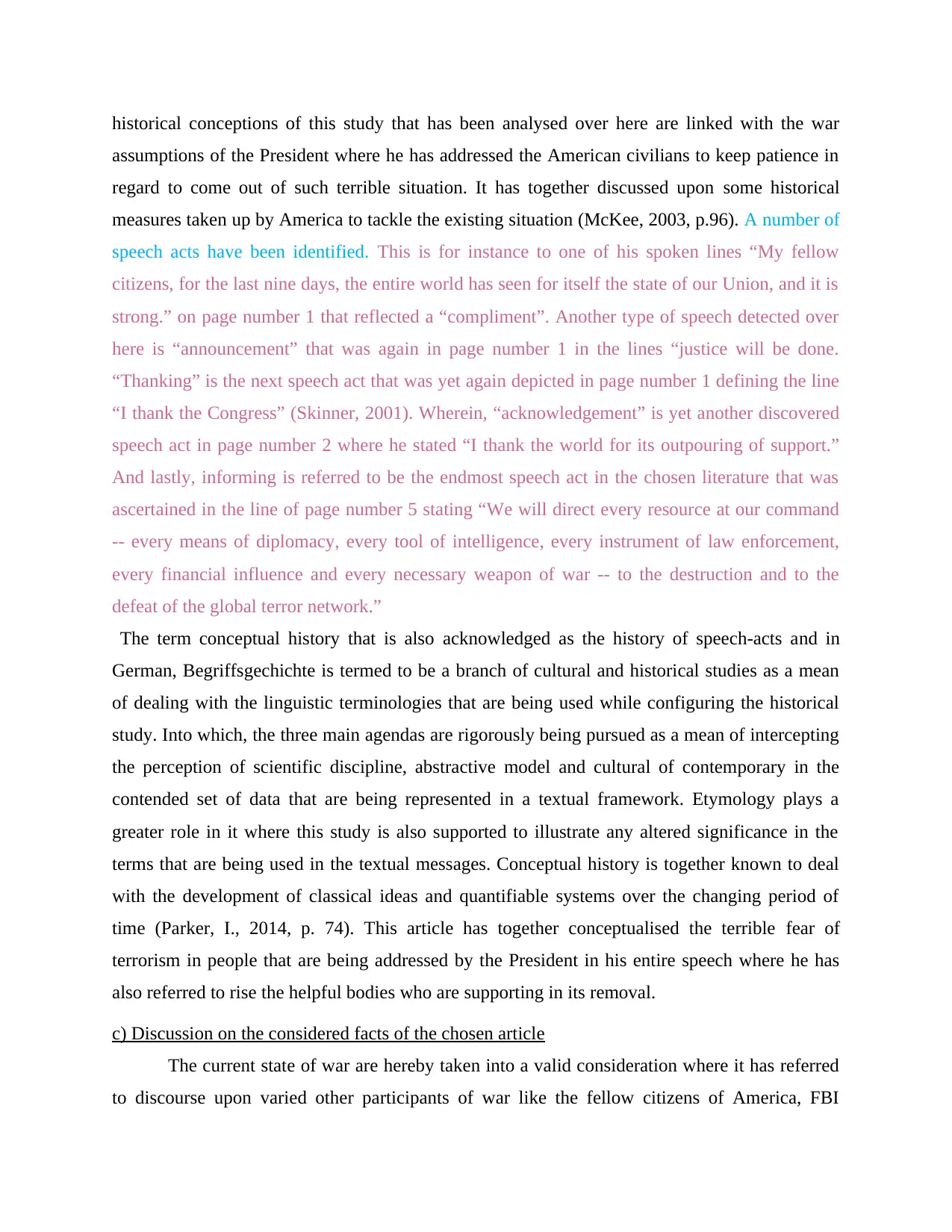
historical conceptions of this study that has been analysed over here are linked with the war
assumptions of the President where he has addressed the American civilians to keep patience in
regard to come out of such terrible situation. It has together discussed upon some historical
measures taken up by America to tackle the existing situation (McKee, 2003, p.96). A number of
speech acts have been identified. This is for instance to one of his spoken lines “My fellow
citizens, for the last nine days, the entire world has seen for itself the state of our Union, and it is
strong.” on page number 1 that reflected a “compliment”. Another type of speech detected over
here is “announcement” that was again in page number 1 in the lines “justice will be done.
“Thanking” is the next speech act that was yet again depicted in page number 1 defining the line
“I thank the Congress” (Skinner, 2001). Wherein, “acknowledgement” is yet another discovered
speech act in page number 2 where he stated “I thank the world for its outpouring of support.”
And lastly, informing is referred to be the endmost speech act in the chosen literature that was
ascertained in the line of page number 5 stating “We will direct every resource at our command
-- every means of diplomacy, every tool of intelligence, every instrument of law enforcement,
every financial influence and every necessary weapon of war -- to the destruction and to the
defeat of the global terror network.”
The term conceptual history that is also acknowledged as the history of speech-acts and in
German, Begriffsgechichte is termed to be a branch of cultural and historical studies as a mean
of dealing with the linguistic terminologies that are being used while configuring the historical
study. Into which, the three main agendas are rigorously being pursued as a mean of intercepting
the perception of scientific discipline, abstractive model and cultural of contemporary in the
contended set of data that are being represented in a textual framework. Etymology plays a
greater role in it where this study is also supported to illustrate any altered significance in the
terms that are being used in the textual messages. Conceptual history is together known to deal
with the development of classical ideas and quantifiable systems over the changing period of
time (Parker, I., 2014, p. 74). This article has together conceptualised the terrible fear of
terrorism in people that are being addressed by the President in his entire speech where he has
also referred to rise the helpful bodies who are supporting in its removal.
c) Discussion on the considered facts of the chosen article
The current state of war are hereby taken into a valid consideration where it has referred
to discourse upon varied other participants of war like the fellow citizens of America, FBI
assumptions of the President where he has addressed the American civilians to keep patience in
regard to come out of such terrible situation. It has together discussed upon some historical
measures taken up by America to tackle the existing situation (McKee, 2003, p.96). A number of
speech acts have been identified. This is for instance to one of his spoken lines “My fellow
citizens, for the last nine days, the entire world has seen for itself the state of our Union, and it is
strong.” on page number 1 that reflected a “compliment”. Another type of speech detected over
here is “announcement” that was again in page number 1 in the lines “justice will be done.
“Thanking” is the next speech act that was yet again depicted in page number 1 defining the line
“I thank the Congress” (Skinner, 2001). Wherein, “acknowledgement” is yet another discovered
speech act in page number 2 where he stated “I thank the world for its outpouring of support.”
And lastly, informing is referred to be the endmost speech act in the chosen literature that was
ascertained in the line of page number 5 stating “We will direct every resource at our command
-- every means of diplomacy, every tool of intelligence, every instrument of law enforcement,
every financial influence and every necessary weapon of war -- to the destruction and to the
defeat of the global terror network.”
The term conceptual history that is also acknowledged as the history of speech-acts and in
German, Begriffsgechichte is termed to be a branch of cultural and historical studies as a mean
of dealing with the linguistic terminologies that are being used while configuring the historical
study. Into which, the three main agendas are rigorously being pursued as a mean of intercepting
the perception of scientific discipline, abstractive model and cultural of contemporary in the
contended set of data that are being represented in a textual framework. Etymology plays a
greater role in it where this study is also supported to illustrate any altered significance in the
terms that are being used in the textual messages. Conceptual history is together known to deal
with the development of classical ideas and quantifiable systems over the changing period of
time (Parker, I., 2014, p. 74). This article has together conceptualised the terrible fear of
terrorism in people that are being addressed by the President in his entire speech where he has
also referred to rise the helpful bodies who are supporting in its removal.
c) Discussion on the considered facts of the chosen article
The current state of war are hereby taken into a valid consideration where it has referred
to discourse upon varied other participants of war like the fellow citizens of America, FBI
Paraphrase This Document
Need a fresh take? Get an instant paraphrase of this document with our AI Paraphraser
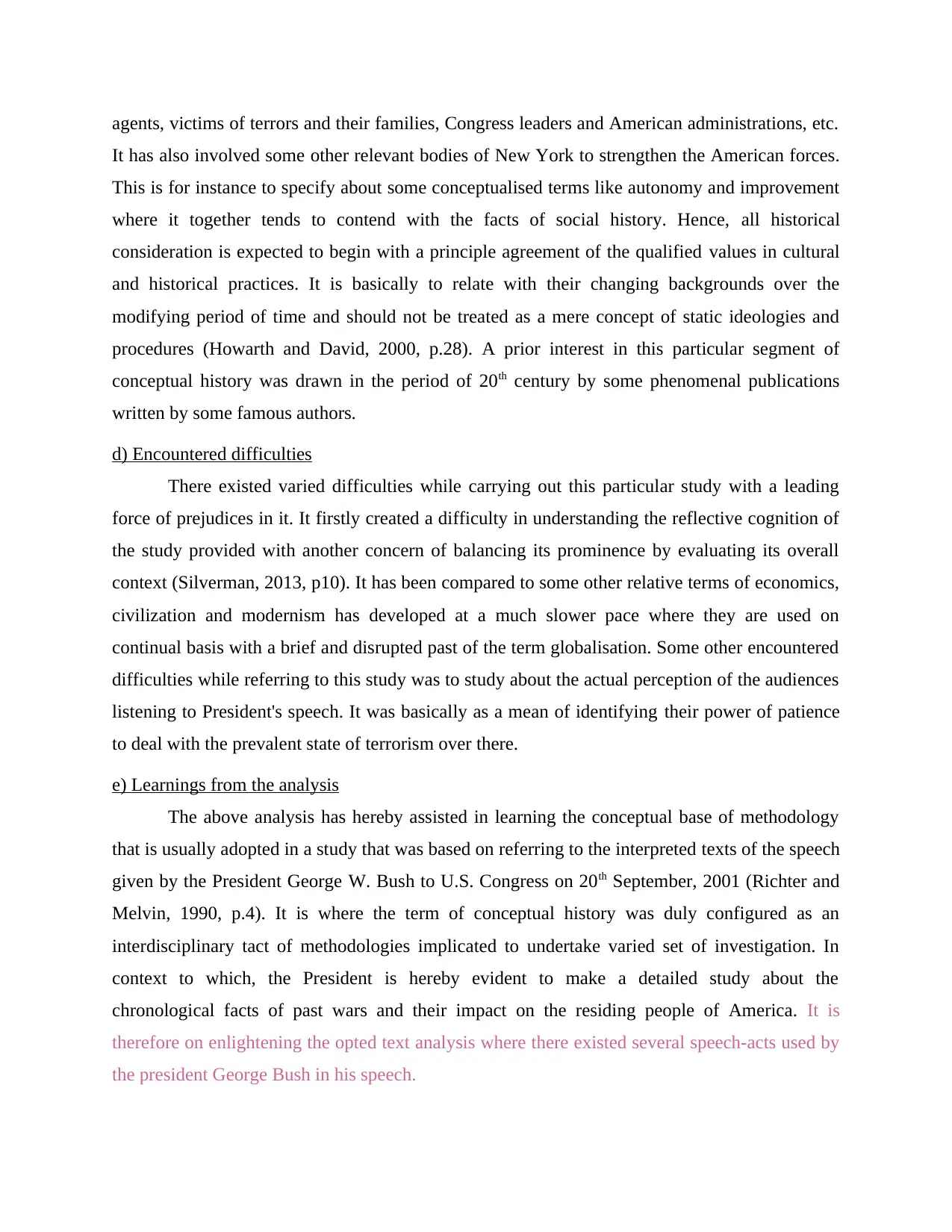
agents, victims of terrors and their families, Congress leaders and American administrations, etc.
It has also involved some other relevant bodies of New York to strengthen the American forces.
This is for instance to specify about some conceptualised terms like autonomy and improvement
where it together tends to contend with the facts of social history. Hence, all historical
consideration is expected to begin with a principle agreement of the qualified values in cultural
and historical practices. It is basically to relate with their changing backgrounds over the
modifying period of time and should not be treated as a mere concept of static ideologies and
procedures (Howarth and David, 2000, p.28). A prior interest in this particular segment of
conceptual history was drawn in the period of 20th century by some phenomenal publications
written by some famous authors.
d) Encountered difficulties
There existed varied difficulties while carrying out this particular study with a leading
force of prejudices in it. It firstly created a difficulty in understanding the reflective cognition of
the study provided with another concern of balancing its prominence by evaluating its overall
context (Silverman, 2013, p10). It has been compared to some other relative terms of economics,
civilization and modernism has developed at a much slower pace where they are used on
continual basis with a brief and disrupted past of the term globalisation. Some other encountered
difficulties while referring to this study was to study about the actual perception of the audiences
listening to President's speech. It was basically as a mean of identifying their power of patience
to deal with the prevalent state of terrorism over there.
e) Learnings from the analysis
The above analysis has hereby assisted in learning the conceptual base of methodology
that is usually adopted in a study that was based on referring to the interpreted texts of the speech
given by the President George W. Bush to U.S. Congress on 20th September, 2001 (Richter and
Melvin, 1990, p.4). It is where the term of conceptual history was duly configured as an
interdisciplinary tact of methodologies implicated to undertake varied set of investigation. In
context to which, the President is hereby evident to make a detailed study about the
chronological facts of past wars and their impact on the residing people of America. It is
therefore on enlightening the opted text analysis where there existed several speech-acts used by
the president George Bush in his speech.
It has also involved some other relevant bodies of New York to strengthen the American forces.
This is for instance to specify about some conceptualised terms like autonomy and improvement
where it together tends to contend with the facts of social history. Hence, all historical
consideration is expected to begin with a principle agreement of the qualified values in cultural
and historical practices. It is basically to relate with their changing backgrounds over the
modifying period of time and should not be treated as a mere concept of static ideologies and
procedures (Howarth and David, 2000, p.28). A prior interest in this particular segment of
conceptual history was drawn in the period of 20th century by some phenomenal publications
written by some famous authors.
d) Encountered difficulties
There existed varied difficulties while carrying out this particular study with a leading
force of prejudices in it. It firstly created a difficulty in understanding the reflective cognition of
the study provided with another concern of balancing its prominence by evaluating its overall
context (Silverman, 2013, p10). It has been compared to some other relative terms of economics,
civilization and modernism has developed at a much slower pace where they are used on
continual basis with a brief and disrupted past of the term globalisation. Some other encountered
difficulties while referring to this study was to study about the actual perception of the audiences
listening to President's speech. It was basically as a mean of identifying their power of patience
to deal with the prevalent state of terrorism over there.
e) Learnings from the analysis
The above analysis has hereby assisted in learning the conceptual base of methodology
that is usually adopted in a study that was based on referring to the interpreted texts of the speech
given by the President George W. Bush to U.S. Congress on 20th September, 2001 (Richter and
Melvin, 1990, p.4). It is where the term of conceptual history was duly configured as an
interdisciplinary tact of methodologies implicated to undertake varied set of investigation. In
context to which, the President is hereby evident to make a detailed study about the
chronological facts of past wars and their impact on the residing people of America. It is
therefore on enlightening the opted text analysis where there existed several speech-acts used by
the president George Bush in his speech.
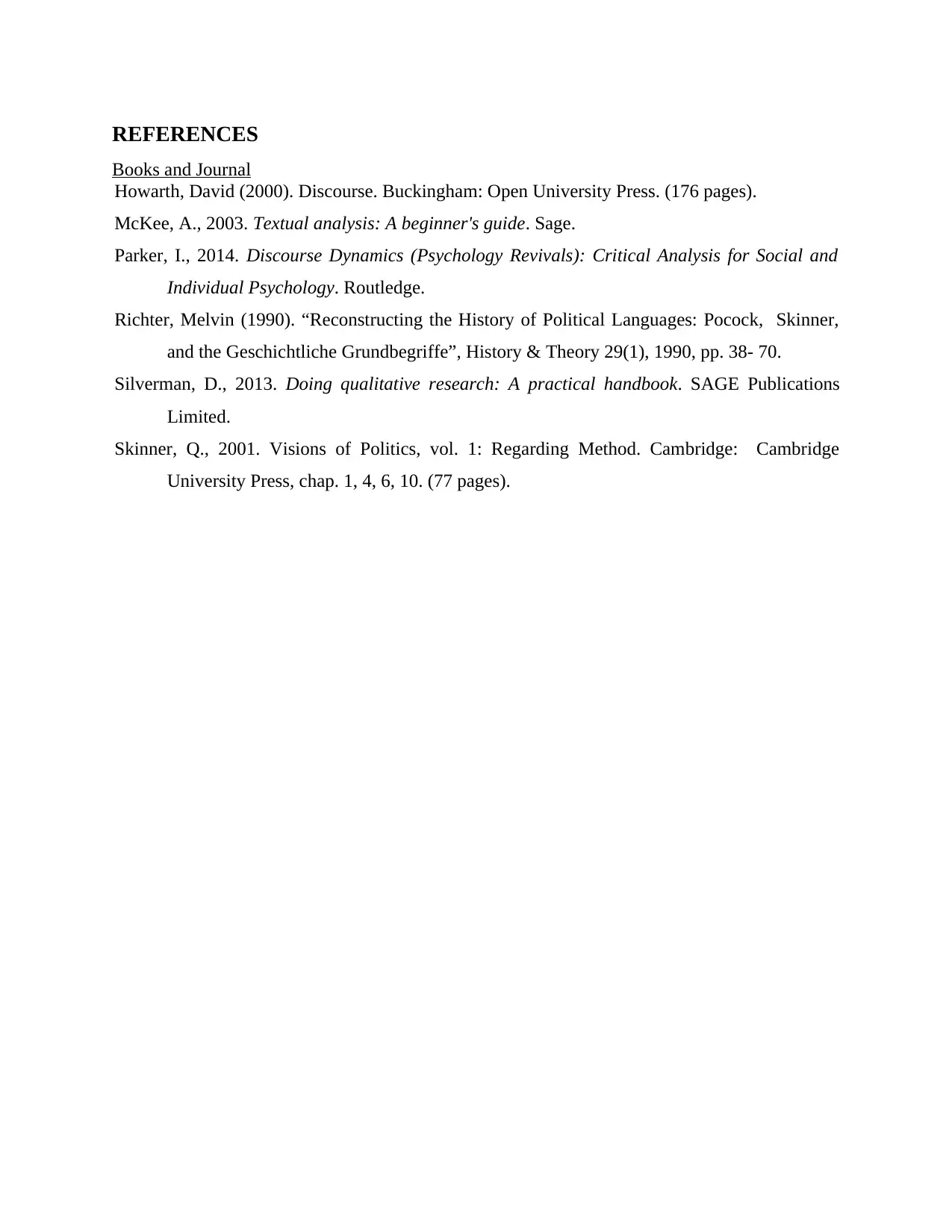
REFERENCES
Books and Journal
Howarth, David (2000). Discourse. Buckingham: Open University Press. (176 pages).
McKee, A., 2003. Textual analysis: A beginner's guide. Sage.
Parker, I., 2014. Discourse Dynamics (Psychology Revivals): Critical Analysis for Social and
Individual Psychology. Routledge.
Richter, Melvin (1990). “Reconstructing the History of Political Languages: Pocock, Skinner,
and the Geschichtliche Grundbegriffe”, History & Theory 29(1), 1990, pp. 38- 70.
Silverman, D., 2013. Doing qualitative research: A practical handbook. SAGE Publications
Limited.
Skinner, Q., 2001. Visions of Politics, vol. 1: Regarding Method. Cambridge: Cambridge
University Press, chap. 1, 4, 6, 10. (77 pages).
Books and Journal
Howarth, David (2000). Discourse. Buckingham: Open University Press. (176 pages).
McKee, A., 2003. Textual analysis: A beginner's guide. Sage.
Parker, I., 2014. Discourse Dynamics (Psychology Revivals): Critical Analysis for Social and
Individual Psychology. Routledge.
Richter, Melvin (1990). “Reconstructing the History of Political Languages: Pocock, Skinner,
and the Geschichtliche Grundbegriffe”, History & Theory 29(1), 1990, pp. 38- 70.
Silverman, D., 2013. Doing qualitative research: A practical handbook. SAGE Publications
Limited.
Skinner, Q., 2001. Visions of Politics, vol. 1: Regarding Method. Cambridge: Cambridge
University Press, chap. 1, 4, 6, 10. (77 pages).
⊘ This is a preview!⊘
Do you want full access?
Subscribe today to unlock all pages.

Trusted by 1+ million students worldwide
1 out of 6
Your All-in-One AI-Powered Toolkit for Academic Success.
+13062052269
info@desklib.com
Available 24*7 on WhatsApp / Email
![[object Object]](/_next/static/media/star-bottom.7253800d.svg)
Unlock your academic potential
Copyright © 2020–2026 A2Z Services. All Rights Reserved. Developed and managed by ZUCOL.